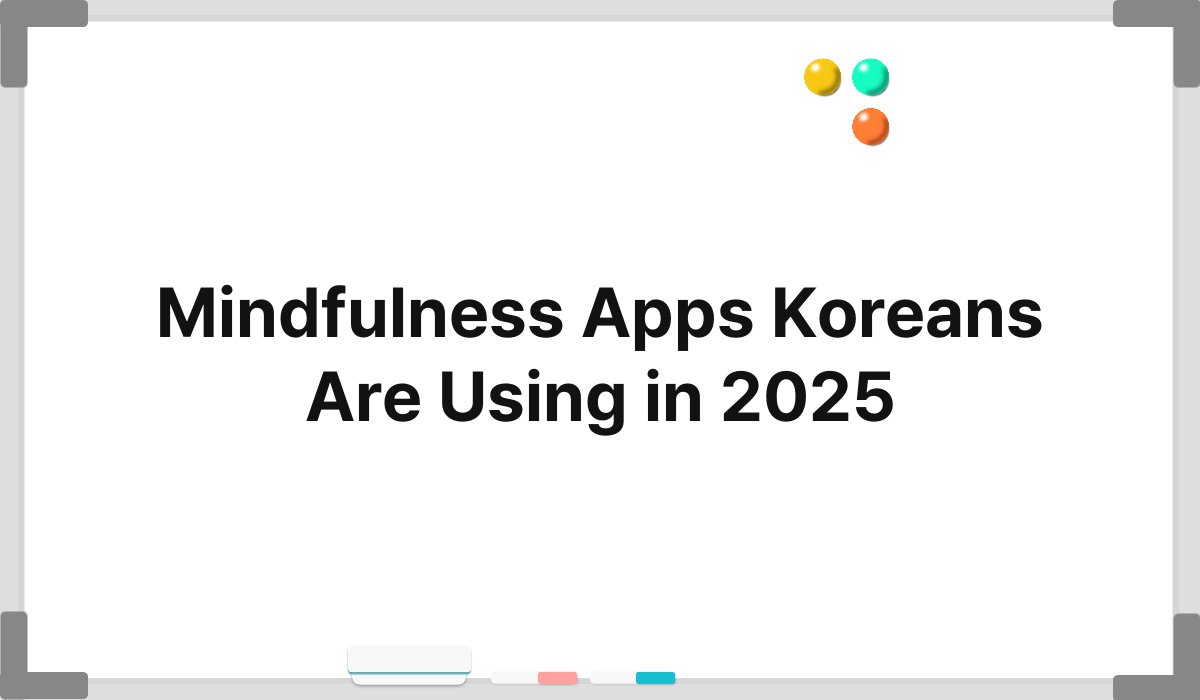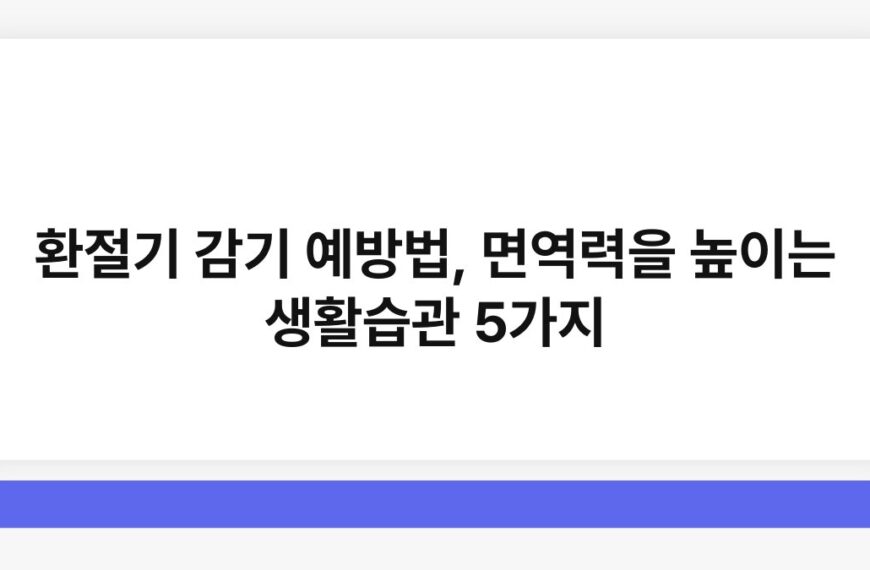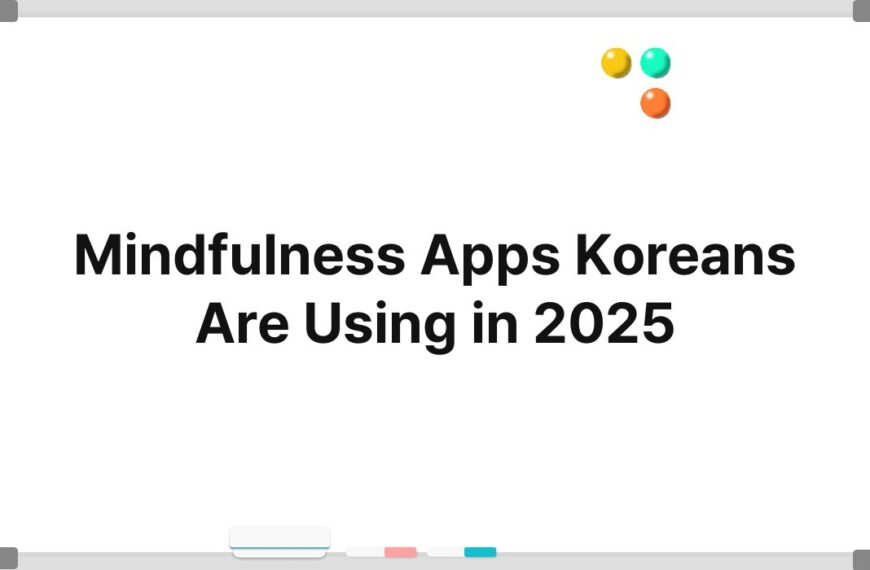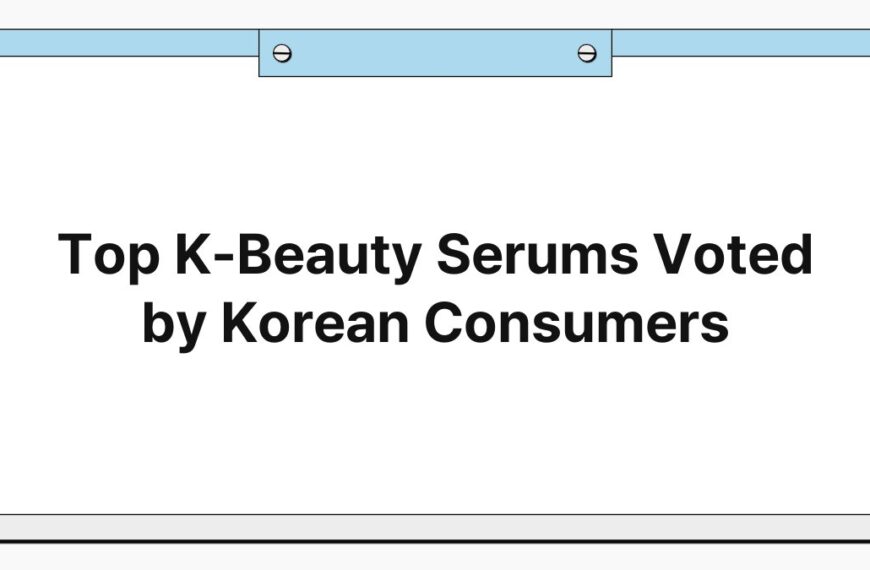[K-Bridge/Samuel] In 2025, mindfulness apps have become an integral part of daily life for many Koreans, reflecting a growing awareness of mental health and well-being.
These applications offer various features designed to help users cultivate mindfulness, reduce stress, and enhance emotional resilience.
As technology evolves, so do the tools available for personal development, making mindfulness practices more accessible than ever.
This article will delve into the mindfulness apps Koreans are using in 2025, exploring their unique features, user experiences, and the impact they have on mental health.
By reading this, you will gain insight into the various applications available, how they are being utilized, and the overall trends in mindfulness practices in Korea.
The Rise of Mindfulness Apps Koreans Are Using in 2025
The Popularity of Mindfulness Among Koreans
The surge in mindfulness app usage in Korea can be attributed to a collective shift towards prioritizing mental health.
With increasing awareness of the importance of emotional well-being, many individuals are seeking effective tools to manage stress and anxiety.
Mindfulness practices, once considered niche, are now widely accepted as valuable components of a balanced lifestyle.
This cultural shift is reflected in the growing number of mindfulness apps available on the market, catering to diverse needs and preferences.
Mindfulness apps are designed to provide users with guided meditations, breathing exercises, and relaxation techniques that can be easily integrated into daily routines.
As the fast-paced nature of modern life continues to create stress, these applications offer a much-needed refuge.
They empower users to take control of their mental health, fostering a sense of calm and clarity amidst the chaos.
Consequently, more Koreans are downloading these apps, participating in mindfulness practices, and sharing their experiences with others.
Moreover, social media plays a significant role in promoting mindfulness among the younger generation.
As influencers and mental health advocates share their journeys with mindfulness apps, more individuals feel encouraged to explore these tools.
This has led to a vibrant community of users who support one another in their mindfulness journeys.
The collective movement towards mindfulness is transforming the way Koreans approach mental health, making it a priority rather than an afterthought.
Key Features of Mindfulness Apps Koreans Are Using
The mindfulness apps popular among Koreans in 2025 offer a variety of features that cater to different user preferences.
One of the most common elements is guided meditation sessions, which can range from a few minutes to over an hour.
These sessions are often tailored to specific needs, such as stress relief, sleep enhancement, or emotional regulation.
Users can select sessions based on their current mood or desired outcome, making the experience personalized and effective.
Another notable feature is the inclusion of progress tracking tools.
Many apps allow users to monitor their meditation habits, set goals, and celebrate milestones.
This gamification aspect encourages consistent practice, fostering a sense of achievement and motivation.
Users can visualize their progress over time, reinforcing the positive impact of mindfulness on their daily lives.
Additionally, many mindfulness apps incorporate community features, enabling users to connect with others on similar journeys.
This sense of belonging can be particularly beneficial for individuals who may feel isolated in their mindfulness practices.
By sharing experiences, challenges, and successes, users can cultivate a supportive network that enhances their commitment to mindfulness.
User Experiences with Mindfulness Apps Koreans Are Using
The experiences of users with mindfulness apps in Korea vary widely, reflecting individual preferences and needs.
Many users report significant improvements in their mental well-being after incorporating these apps into their daily routines.
They often highlight the convenience of having guided meditation available at their fingertips, allowing them to practice mindfulness anytime, anywhere.
Some users appreciate the variety of content offered by these apps, enabling them to explore different meditation styles and techniques.
This diversity helps prevent monotony, keeping users engaged and motivated to continue their mindfulness journey.
Positive user feedback often emphasizes how these apps have helped them develop a deeper understanding of their thoughts and emotions, leading to greater self-awareness and emotional regulation.
However, not all experiences are positive.
Some users struggle with maintaining consistency in their practice, particularly in the face of busy schedules and distractions.
Others may find it challenging to connect with the content or the app’s interface.
Despite these challenges, many users remain committed to their mindfulness practices, recognizing the long-term benefits of cultivating a mindful mindset.
The Impact of Mindfulness Apps Koreans Are Using on Mental Health
Enhancing Emotional Resilience Through Mindfulness Apps
Mindfulness apps have a profound impact on emotional resilience, providing users with tools to navigate life’s challenges.
By regularly engaging in mindfulness practices, individuals can develop a greater capacity to cope with stress and adversity.
These apps often include techniques for grounding and centering, which can be particularly helpful during difficult times.
Users frequently report feeling more equipped to handle emotional upheaval after practicing mindfulness.
As they learn to observe their thoughts and feelings without judgment, they cultivate a sense of detachment that allows them to respond to challenges with clarity and composure.
This shift in perspective can lead to improved decision-making and healthier relationships, as individuals become more attuned to their emotional states.
Furthermore, the regular practice of mindfulness can lead to lasting changes in brain structure and function.
Research indicates that consistent mindfulness practice can increase gray matter density in areas of the brain associated with emotional regulation and self-awareness.
This neuroplasticity reinforces the benefits of mindfulness apps, as users experience tangible improvements in their mental health over time.
Reducing Stress and Anxiety with Mindfulness Apps
The primary aim of many mindfulness apps is to help users reduce stress and anxiety.
By offering guided meditations and relaxation techniques, these apps provide individuals with effective tools to manage their mental health.
Users can engage in short sessions during stressful moments, allowing them to regain control and clarity.
The practice of mindfulness encourages individuals to focus on the present moment, which can significantly alleviate feelings of anxiety.
By redirecting attention away from worries about the future or regrets from the past, users can cultivate a sense of calm and acceptance.
This shift in focus can be particularly beneficial for those struggling with chronic anxiety, as mindfulness offers a pathway to greater emotional stability.
Additionally, many mindfulness apps incorporate breathing exercises that help users regulate their physiological responses to stress.
By learning to control their breath, individuals can activate the body’s relaxation response, reducing tension and promoting a sense of well-being.
This holistic approach to mental health is increasingly recognized as a valuable complement to traditional therapeutic methods.
Fostering a Culture of Mindfulness in Korea
The growing popularity of mindfulness apps is contributing to a broader cultural shift towards mindfulness in Korea.
As more individuals embrace these practices, there is a collective movement towards prioritizing mental health and well-being.
This cultural transformation is evident in various sectors, including education, workplace environments, and community initiatives.
In educational settings, schools are beginning to incorporate mindfulness practices into their curricula.
By teaching students the importance of emotional regulation and self-awareness, educators are fostering a generation that values mental health.
This proactive approach is essential in addressing the increasing rates of stress and anxiety among young people.
In the workplace, organizations are recognizing the benefits of mindfulness for employee well-being.
Many companies are offering mindfulness training and resources to support their employees’ mental health.
This shift not only enhances individual well-being but also contributes to a more positive and productive work environment.
The Future of Mindfulness Apps Koreans Are Using
Innovations in Mindfulness App Technology
As technology continues to advance, the future of mindfulness apps in Korea looks promising.
Developers are constantly exploring innovative features to enhance user experience and engagement.
One potential area of growth is the integration of artificial intelligence, allowing apps to provide personalized recommendations based on user behavior and preferences.
Moreover, advancements in virtual and augmented reality could revolutionize the way users experience mindfulness.
Immersive environments could transport users to calming landscapes, enhancing their meditation practices.
This technology could provide a unique sensory experience, making mindfulness more accessible and engaging for a wider audience.
Additionally, mindfulness apps may increasingly incorporate biofeedback mechanisms, allowing users to monitor their physiological responses during meditation.
By providing real-time data on heart rate variability or stress levels, users can gain deeper insights into their mental states, enhancing their mindfulness practices.
Expanding Accessibility of Mindfulness Apps
The accessibility of mindfulness apps is crucial in promoting mental health across diverse populations.
In 2025, efforts are being made to ensure that these applications are available in multiple languages and cater to various cultural contexts.
This inclusivity will allow more individuals to benefit from mindfulness practices, regardless of their background.
Furthermore, affordability remains a key consideration in expanding access to mindfulness apps.
Many developers are exploring freemium models, offering basic features for free while providing premium content for a fee.
This approach ensures that individuals from different economic backgrounds can engage with mindfulness practices without financial barriers.
Community outreach initiatives are also playing a vital role in promoting mindfulness app usage.
Workshops, seminars, and events focused on mental health education can help raise awareness about the benefits of mindfulness.
By fostering a culture of mindfulness within communities, more individuals will feel empowered to prioritize their mental well-being.
The Role of Mindfulness Apps in Post-Pandemic Recovery
In the wake of the COVID-19 pandemic, mindfulness apps have emerged as essential tools for recovery.
The mental health impacts of the pandemic have been profound, leading to increased rates of anxiety, depression, and stress.
Mindfulness practices offer a valuable means of coping with these challenges, providing individuals with resources to navigate their emotions.
As society continues to heal from the pandemic, mindfulness apps will play a crucial role in supporting mental health.
By encouraging regular mindfulness practice, these apps can help individuals build resilience and adaptability in the face of ongoing uncertainty.
The collective experience of the pandemic has underscored the importance of mental health, making mindfulness practices more relevant than ever.
Through community engagement and education, mindfulness apps can foster a culture of support and understanding.
As individuals share their experiences and insights, they contribute to a collective narrative that prioritizes mental well-being.
This cultural shift will not only benefit individuals but also strengthen communities as a whole.
Conclusion
Mindfulness apps have become an essential part of the mental health landscape in Korea in 2025. With their diverse features and user-friendly interfaces, these applications are empowering individuals to prioritize their well-being.
As the popularity of mindfulness continues to grow, the impact on mental health and emotional resilience is becoming increasingly evident.
By embracing these practices, Koreans are fostering a culture of mindfulness that promotes emotional well-being and community support.
The future of mindfulness apps looks bright, with innovations and accessibility paving the way for even greater engagement in the years to come.








